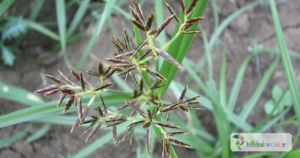Introduction:
Cyperus rotundus Linn., commonly known as Nut Grass, is a weed found throughout India up to an altitude of 2,000 meters. This member of the Cyperaceae family holds a prominent place in traditional medicine. Nagarmotha is used to treat indigestion, diarrhea, dysentery, joint pain, reduce inflammation, rheumatic conditions, reduce fever and regulates menstrual health. By shedding light on its unique properties, we aim to uncover the therapeutic applications and health potential of Nut Grass.
Nagarmotha – The Medicinal Marvel

Names and Habitat Of Nagarmotha
Cyperus rotundus is commonly referred to as Nut Grass and belongs to the Cyperaceae family. It is widely distributed throughout India, often found growing as a weed up to an altitude of 2,000 meters.
Traditional Uses and Medicinal Benefits Of Nagarmotha
Nut Grass (Cyperus rotundus) has a rich history of traditional usage and offers various potential medicinal benefits.
1. Carminative and Astringent Properties:
Nut Grass is known for its carminative and astringent properties. These qualities make it useful in managing intestinal problems, indigestion, and disorders like diarrhoea and dysentery.
2. Anti-inflammatory and Antirheumatic Properties:
With its anti-inflammatory and antirheumatic properties, Nut Grass is utilized to alleviate symptoms associated with rheumatism and inflammations. It may provide relief from joint pain and reduce inflammation.
3. Hepatoprotective and Diuretic Effects:
Nut Grass exhibits hepatoprotective properties, making it beneficial for liver health. Additionally, it possesses diuretic effects, aiding in the elimination of toxins and promoting urinary health.
4. Antipyretic and Analgesic Effects:
The plant has antipyretic properties and may help reduce fever. Its analgesic effects are beneficial in providing relief from pain.
5. Hypotensive and Emmenagogue Properties:
Nut Grass displays hypotensive effects, which can help regulate blood pressure levels. It also possesses emmenagogue properties, suggesting potential benefits in promoting and regulating menstrual health.
Chemical Composition and Key Components Of Nagarmotha
Nut Grass (Cyperus rotundus) contains various chemical compounds that contribute to its potential medicinal benefits.
1. Essential Minerals:
The tuber of Nut Grass is rich in essential minerals, including Copper (Cu), Iron (Fe), Magnesium (Mg), and Nickel (Ni). These minerals play important roles in overall health and well-being.
2. Beta-sitosterol:
Nut Grass contains beta-sitosterol, a compound known for its significant anti-inflammatory activity. It exhibits effects similar to hydrocortisone and phenylbutazone, making it valuable in managing inflammation.
3. Sesquiterpenic Compounds:
The presence of the eudalne group of sesquiterpenic compounds, particularly the sesquiterpene alcohol isocyperol, plays an essential role in lipid metabolism, contributing to potential therapeutic effects.
Potential Medicinal Benefits and Therapeutic Applications:
Nut Grass (Cyperus rotundus) holds significant potential for various medicinal applications.
1. Digestive Health Support:
The carminative and astringent properties of Nut Grass make it a potential ally for supporting digestive health. It may help manage intestinal issues, indigestion, and promote overall gastrointestinal well-being.
2. Joint and Inflammation Relief:
Those suffering from rheumatic pain and inflammatory conditions may find relief through Nut Grass. Its anti-inflammatory and antirheumatic properties make it a valuable natural remedy for promoting joint comfort.
3. Liver Protection and Urinary Health Promotion:
The hepatoprotective properties of Nut Grass contribute to liver health, while its diuretic effects aid in the elimination of toxins and support urinary well-being.
4. Fever Reduction and Pain Relief:
Nut Grass may help reduce fever and provide relief from pain, making it useful in managing symptoms associated with various illnesses and inflammatory conditions.
5. Menstrual Health Support:
The emmenagogue properties of Nut Grass suggest its potential in supporting menstrual health by promoting regularity and addressing related issues.
Conclusion:
Nut Grass (Cyperus rotundus Linn.) is a versatile medicinal plant with a rich history of traditional use. Its various names, habitat, traditional uses, and potential health benefits demonstrate its value in traditional medicine.
Nut Grass offers potential therapeutic support for digestive health, inflammation, liver protection, urinary well-being, pain relief, and menstrual health.
By embracing its unique properties and considering individual circumstances, Nut Grass can provide a natural approach to addressing specific health concerns.
As with any herbal remedy, it is advised to consult qualified healthcare professionals before incorporating Nut Grass into a healthcare routine.
Frequently Asked Questions (FAQs):
What is the scientific name for Nut Grass?
The scientific name for Nut Grass is Cyperus rotundus Linn.
What are the traditional uses of Nut Grass?
Nut Grass has traditional uses for managing intestinal problems, indigestion, diarrhoea, dysentery, rheumatism, inflammations, liver health, urinary well-being, fever reduction, pain relief, and menstrual health support.
Does Nut Grass have any medicinal benefits?
Yes, Nut Grass offers potential medicinal benefits such as digestive health support, joint and inflammation relief, liver protection, urinary health promotion, fever reduction, pain relief, and menstrual health support.
What are the key chemical components of Nut Grass?
Nut Grass contains essential minerals like copper, iron, magnesium, and nickel. It also contains beta-sitosterol and sesquiterpenic compounds.
How can Nut Grass support digestive health?
The carminative and astringent properties of Nut Grass make it beneficial for managing intestinal problems, indigestion, and gastrointestinal well-being.
Can Nut Grass provide relief from joint pain and inflammation?
Yes, Nut Grass has anti-inflammatory and antirheumatic properties that may help alleviate symptoms associated with joint pain and inflammation.
What are the potential effects of Nut Grass on liver health and urinary well-being?
Nut Grass exhibits hepatoprotective properties, which can support liver health. It also possesses diuretic effects that aid in toxin elimination and promote urinary well-being.
Can Nut Grass help reduce fever and relieve pain?
Nut Grass has antipyretic properties that may assist in reducing fever, and its analgesic effects can provide relief from pain.
Does Nut Grass have any effects on menstrual health?
Nut Grass displays emmenagogue properties, which suggest potential benefits in supporting menstrual health by promoting regularity and addressing related issues.
Is Nut Grass safe to use?
While Nut Grass offers potential health benefits, it is important to approach its use with caution.
Can Nut Grass be used as a substitute for conventional medication?
Nut Grass should not be used as a substitute for conventional medication.
Are there any known side effects of Nut Grass?
Specific side effects of Nut Grass have not been mentioned. However, individual sensitivities, allergies, or contraindications may exist.
Can Nut Grass be consumed as a dietary supplement?
The consumption of Nut Grass as a dietary supplement should be done under professional guidance to ensure safe and appropriate use.
Can Nut Grass be used topically?
There is no specific mention of topical use of Nut Grass. Professional guidance is advisable for any form of usage.





